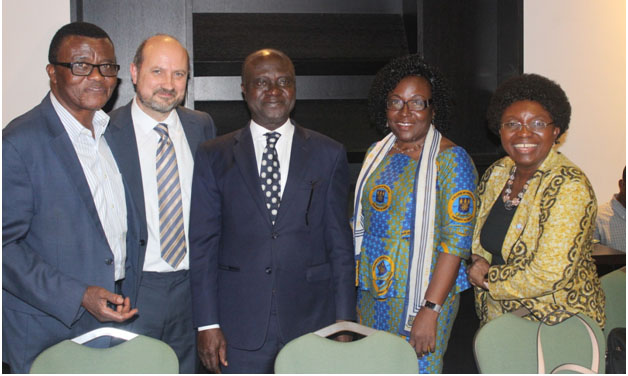From left: Professor Baffour Agyeman-Duah,Mr Ivan Kent Deputy Director Global Panel on Agriculture and Food Systems for Nutrition, Professor Gyan Baffour,Prof. Matilda Steiner-Aseidu, Professor of Nutrition, University of Ghana and Prof. Anna Lartey, Director of Nutrition FAO United Nations, Rome.
The Ministry of Planning has convened an inter-ministerial meeting aimed at identifying ways to implement policies to improve diets to contribute to the overall reduction of malnutrition in the country.
The meeting was put together by the John Agyekum Kufuor Foundation (JAK Foundation) and the Global Panel on Agriculture and Food System for Nutrition. Stakeholders were tasked to consider giving greater priority in terms of avoiding the loss and waste of nutritious foods that are being produced.
Delivering a consensus statement after the meeting, Professor Gyan Baffour – Minister for Planning – observed that the nation had demonstrated progress in tackling malnutrition, with Ghana among the few African countries likely to meet the World Health Assembly (WHA) target for children under five.
However, he noted that there was ample evidence that the country’s nutrition transition has implication for development planning.
The meeting was aimed at providing opportunity for the ministries to better understand their role and contributions towards improving the nutritional status of all citizens throughout their life cycle.
“Optimal nutrition is vital to our country’s development. Deficiencies in the nutritional status of the different cohort of our population are a matter of concern to our policymakers due to its negative impact on the country’s socio-economic development,” he said.
Prof. Baffour, therefore, noted that the ministries would, among others, commit to encourage dialogue with multiple stakeholders within the government and beyond on forward-thinking interventions within existing policy framework to improve nutrition and promote healthy diets in Ghana.
Professor Sandy Thomas, Director of the Global Panel on Agriculture and Food Systems for Nutrition, stressed the need for government policies to ensure high nutrition from farm to the table, as the country was still struggling with high rates of anemia in women and stunting in children.
She said the meeting was to draw the attention of policymakers to factors like climate change, food imports, population growth and urbanization – all of which affect the quality of food.
Professor Baffour Agyeman-Duah, CEO of the JAK Foundation, said the current government had shown willingness to shift policy priorities from feeding to nourishing its people and “the JAK Foundation and Global Panel stand ready to support such courageous and much-needed action.”
By Jamila Akweley Okertchiri


